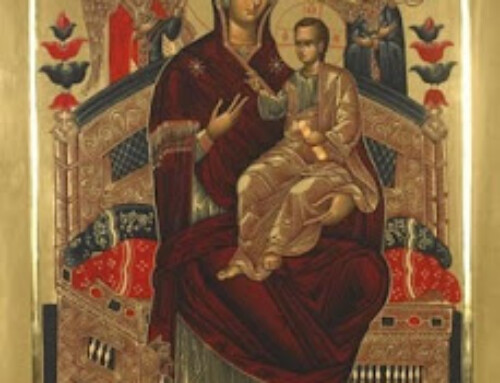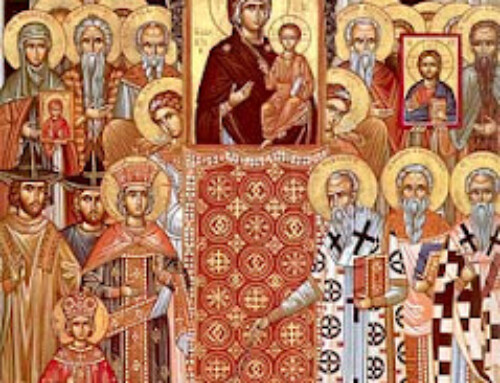Word Magazine September 1998 Page 20
TEACHING THE TRUTH
By Father Ted Bobosh
One great challenge for us Orthodox in doing Christian education is coming to terms with our concept of truth. Christianity claims to offer truth to the world. In Christian education, we strive to instruct all disciples in the truth. The real question (which, ironically, Pontius Pilate asked), is “What is truth?” (John 18:38) He neither waited for Christ’s answer, nor, by allowing the crucifixion, showed himself much concerned with the truth anyway.
So, what is the truth? We often equate truth with facts, and consequently in Christian education we aim to teach facts about Christ, the bible, the liturgy or church history, etc., to our people. While facts are part of the truth, they do not contain the fullness of the truth. I believe it was Justin the Martyr who said, “What ever is true is Christian.” Every fact that is true (whether religious, political, scientific, historic, or even “secular”) in some way is part of God’s truth and reveals God to us. Thus, any truth is significant to Christianity. This is based upon the belief that there is such a thing as truth and that truth comes from God and reveals God to us. So, part of education is teaching facts and part of Christian education is using all the facts we know in creation to come to some understanding of truth and therefore of God. This is in our thinking no such thing as godless truth or secular truth. If something is true, it is revelation about creation and for us also about the Creator.
So, teaching facts in Christian education is a partial way of dealing with truth. Information about “things” is true, right, and good. It helps enlighten us about life, the world, and about God. It brings us to some understanding about religion and about God. There is, however, more to truth than simple facts of information to be memorized.
Now we come to the one additional matter of truth which is of special concern for all Christians. Jesus claimed to be the truth see John 14:6 above). Into our educational efforts comes an idea that truth is not limited by facts, but truth is a person, namely Jesus of Nazareth. Not only is the truth a person, but that person is also the Son of God, one o the Holy Trinity. For us to understand truth is to actively engage in a relationship with Jesus Christ. To deal with truth is to have a direct encounter with God.
Knowing the truth is not a static memorization o some facts. Knowing the truth means being actively engaged in a living relationship with God the Holy Trinity through the Lord Jesus. The truth becomes a living being who engages us to think, who challenges the way we see the world, who raises our viewpoint to that of God’s. As is written in Hebrews 4:12: “For the words of God is living and powerful, and sharper than any two-edged word, piercing even to the division of soul and spirit, and of joints and marrow, and is a discerner of the thoughts and intents of the heart.” To know the truth, to teach the truth, to live by the truth, means to enter into a relationship with the Son of God. It means to learn from Him, and to allow Him to open our hearts and minds so that we can by the Holy Spirit judge and discern our own thoughts, words and actions. We come in this process to understand that the Word of God is Jesus Christ and Jesus is the Word of God (John 1). We become His disciples by listening to Him and actively engaging Him to help us see ourselves through His eyes. We in fact open ourselves to a direct experience of the one True God.
Ultimately, instead of just teaching facts about the bible, or just teaching bible stories, we begin to understand that the Word of God meant to shape our thinking, speaking and doing. We are to teach the Word of God, and to learn the Word of God in such a way that we apply it to our daily lives. We allow the Word to influence what we do, and also to challenge and judge us in order to change and improve our spiritual lives because we have entered into a relationship with one of the Persons of the Holy Trinity.
In this way we come to see that treating the truth only as some facts to be learned or memorized is totally inadequate for Christian education. Our task in teaching includes helping each other to look to the Word for discerning how to live each day. We discover in this relationship with the Word of God that the complexities of life, the many “grey” areas of judgment, are not unrelated in the Christian Way. We come again to value the lives of biblical people and saints throughout history who lived in the same real world that we do. They struggled with the Word of God in the complexities of the real world. They don’t necessarily tell us how to act in every situation we face, but we come to appreciate that God’s revelation is relevant to everyone. We in our lives must make the choices, and mistakes. We must learn from our actions, repent, and by being Christ’s disciples engaged in a relationship with Him take up the cross and follow Him.




